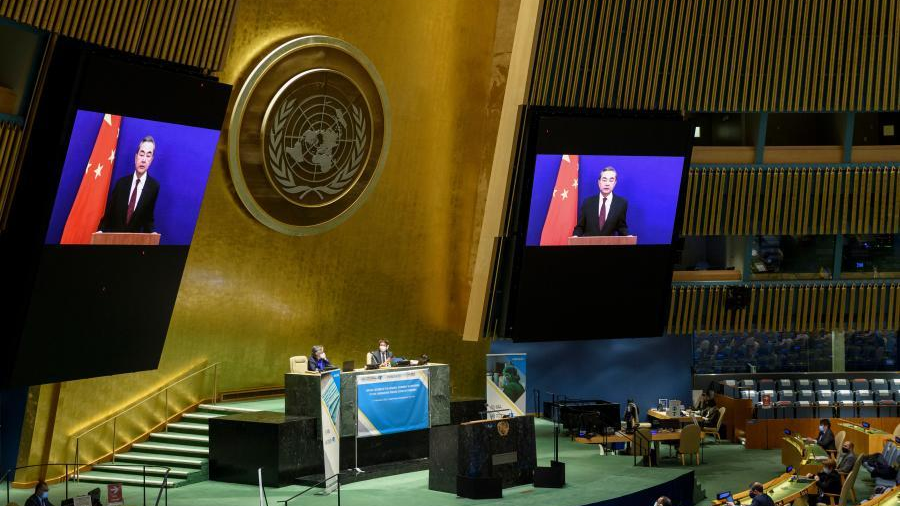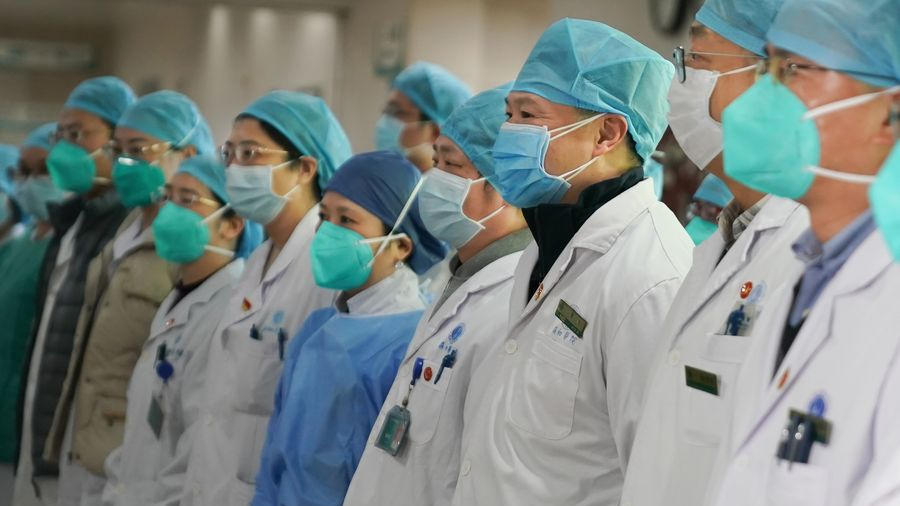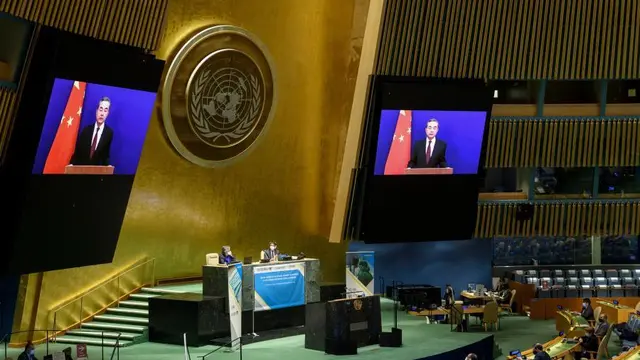
Chinese President's special envoy Wang Yi (on screens), also Chinese state councilor and foreign minister, delivers a virtual speech at the United Nations General Assembly special session in response to the COVID-19 pandemic on December 3, 2020. /Xinhua
Editor's note: Iram Khan is a Pakistan-based commentator on international affairs. The article reflects the author's opinions and not necessarily the views of CGTN.
At the special session of the United Nations General Assembly (UNGA) in response to COVID-19, Chinese Foreign Minister Wang Yi had some practical advice for the international community in mitigating the effects of the pandemic.
China has by far shown the most remarkable ability in the containment as its rapidly rebounding economy unmistakably testifies. Therefore, when China speaks of its experiences, the world lends an intent ear.
While most major countries are still in strong grips of the virus, China's daily cases stay in two digits. This is primarily due to the country's reliance on science and technology, which was emphasized in the Foreign Minister's speech for keeping the virus under check. It is through this leverage that China is restraining the pandemic and developing treatments.
Highlighting this point at the UN session was important since attempts by certain Western circles to disregard science while dealing with COVID-19 resulted in the emergence of new hotspots. Overlooking science had also given way to the spread of misinformation by state and non-state actors to discredit China's successes. The scientific community's consistent support for China's initiatives, meanwhile, helped curb some politically motivated accusations.
Countries adopted varying approaches in their anti-COVID-19 campaigns but only those emerged triumphant that relied on proven facts and paid heed to their medical experts. Thanks to these endeavors, several vaccines in China and abroad have entered the final stages of trials in record time despite adverse working conditions.
China, on its part, pledged to make its domestically developed vaccines a global public good. It has promised to provide them to developing countries, in what Wang termed China's commitment to "building a community of health for all."

Medical staff of Union Hospital affiliated to Tongji Medical College of Huazhong University of Science and Technology attend a ceremony to form a "assault team" in the fight against the pneumonia caused by the novel coronavirus in Wuhan, China, January 22, 2020. /Xinhua
Making vaccines accessible for every person on earth is necessary because, in their absence, even if a single person remains infected, everybody remains at risk. The key here is coordination between the developed and the developing nations.
Greater responsibility, of course, lies with major countries because of their ample resources and scientific talent. They have to come forward like China and offer support to the disadvantaged regions. In this era of interdependence, everyone has to pool their expertise in solving global problems like the one in question.
A pandemic of this scale is the first of its kind in modern times, thanks to the cheap and fast travel that has given rise to globalization. To make it the last, making public health security a priority, as suggested by Wang, is a must. Strengthening multilateral bodies like the World Health Organization (WHO), as part of the governance system, will enable the world as a whole to address future health crises and bolster emergency response capabilities.
The rich countries with adequate levels of stability are continuing to meet their people's needs in this difficult time. Those in conflict – mostly due to no fault of their own – are at a severe disadvantage. They can neither contain nor treat the disease, while at the same time are unable to secure vaccines for their people.
A special focus is needed on these "weak links" in the campaign to defeat COVID-19. Wang reminded the session's participants of the ceasefire appeal made by the UN so that the fighting can instead be diverted against the virus. For this purpose, unilateralism will have to be discouraged as it is eroding the relatively stable period of history that we live in.
Now that the approvals of vaccines are around the corner, the next challenge is their distribution. Supply chains and industries have already taken a massive hit in the face of lockdowns and shortage of workers. An immediate adaptation to the new working environment and improving international coordination will ensure their speedy revival.
The reduced economic activity has had repercussions on the world's fight against poverty as well. Although China has met its target of eliminating absolute poverty set for this year, elsewhere, people living on the edge of the poverty line are sliding below.
Developing countries, where most people reside in such conditions, do not have the economic leverage available to the more affluent ones. What they could only do was the containment of the virus – as some successfully did. For the supply of vaccines and economic recovery, they remain dependent on the efforts of the developed nations and the nations that recovered quickly such as China. The most vulnerable, however, are even in the need of humanitarian assistance.
In today's globalized era, boosting the ability of all countries to control outbreaks will help keep future pandemics in check. Wang in this regard proposed devotion of more resources for infectious disease control, public health capacity-building and food security.
China emerged as a responsible nation from the first wave of COVID-19. Its containment and prevention strategies have been exemplary and its vaccine distribution plans, too, are something to be emulated. Other nations should take the world likewise along in the path to a complete economic recovery.
(If you want to contribute and have specific expertise, please contact us at [email protected].)
 简体中文
简体中文

